

How Big A Deal Is Economy–Energy CO2 Decoupling? Agriculture Published on March 15th, 2015 | by Sandy Dechert March 15th, 2015 by Sandy Dechert We’ve heard some cautious rejoicing comes from scientists and media this weekend about the world economy and energy carbon dioxide emissions finally decoupling last year.
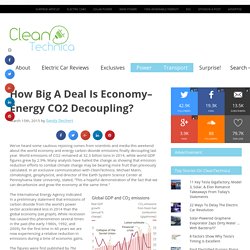
World emissions of CO2 remained at 32.3 billion tons in 2014, while world GDP figures grew by 2.9%. Many analysts have hailed the change as showing that emission reduction efforts to combat climate change may be bearing more fruit than previously calculated. The International Energy Agency indicated in a preliminary statement that emissions of carbon dioxide from the world’s power sector accelerated less in 2014 than the global economy (see graph). The False Promise Of Decoupling GDP Growth From Resource Consumption. January 15th, 2016 by Guest Contributor Originally published on SameFacts.org.
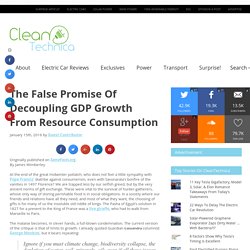
By James Wimberley At the end of the great midwinter potlatch, who does not feel a little sympathy with Pope Francis’ diatribe against consumerism, even with Savonarala’s bonfire of the vanities in 1497 Florence? We are trapped less by our selfish greed, but by the very ancient norms of gift exchange. These were vital to the survival of hunter-gatherers, whose only way of storing perishable food is in social obligations.
The False Promise Of Decoupling GDP Growth From Resource Consumption. Income and Total Domestic Material Consumption per capita for mature (blue circles), emerging/developing countries (orange diamonds), and the world (black star), in 1970 (small marker) and 2004 (large marker). The False Promise Of Decoupling GDP Growth From Resource Consumption. You searched for energy - Dupress. Moving to Eliminate Energy Consumption - Point of View - September 2012. Neil Chambers When you compare those states that consume the most energy with those that consume the least, something jumps out at you.
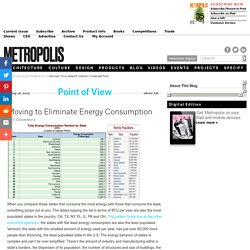
The states topping the list in terms of BTU per year are also the most populated states in the country: CA, TX, NY, FL, IL, PA and OH. Making the circular economy a reality. This post is by Green Alliance associate Julie Hill.
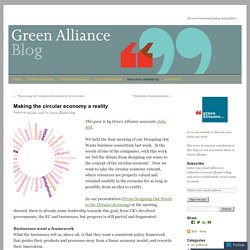
We held the final meeting of our Designing Out Waste business consortium last week. In the words of one of the companies, with this work we ‘led the debate from designing out waste to the concept of the circular economy’. A Financial Model Comparing Car Ownership with UberX (Los Angeles) The costs of annual Uber usage Now it’s time to grab your phone, drop a pin, and let Uber take over.

Keep in mind there are a slew of other ride-sharing companies out there, but we’re using Uber for simplistic sake and because there’s more data out there on this specific company. Uber, like many of its competitors, offer a unique combination of reliability, convenience and luxury at 20–30 percent the price of a cab. Let’s assume you take them everywhere (school, work or even the club). Michel Bauwens Explains the Great Value-Shift of Our Time.
Photo credit: Sebastiaan ter Burg via Foter.com / CC BY.
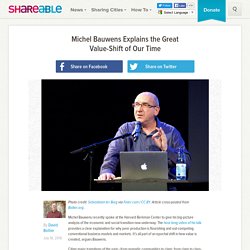
Article cross-posted from Bollier.org. Michel Bauwens recently spoke at the Harvard Berkman Center to give his big-picture analysis of the economic and social transition now underway. The hour-long video of his talk provides a clear explanation for why peer production is flourishing and out-competing conventional business models and markets. It’s all part of an epochal shift in how value is created, argues Bauwens. Are We Shifting to a New Post-Capitalist Value Regime? Michel Bauwens, a Belgian Peer-to-Peer theorist and an active writer, researcher and conference speaker on the subject of technology, culture and business innovation and the founder of the peer to peer foundation, recently spoke at the Harvard Berkman Center to give his overall analysis of the economic and social transition now underway.
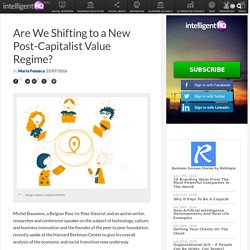
Bauwens has authored a number of essays, including The Political Economy of Peer Production, and has taught at Payap University and Dhurakij Pandit University’s International College, as well as IBICT, Rio de Janeiro. In his talk, the theorist described the main characteristics of an important shift happening in society. According to Bauwens, that epochal shift has to do with how value is created: Communs et systeme. One person, one vote or one dollar, one vote and... We live in times of a hidden war between “one person, one vote” and “one dollar, one vote” ideologies.
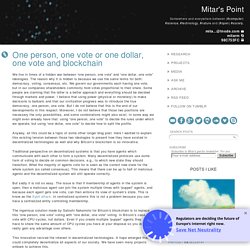
The reason why it is hidden is because we use the same terms for both: democracy, voting, consensus, etc. We govern our governments each having one vote, but in our companies shareholders commonly hold votes proportional to their share. Some people are claiming that the latter is a better approach and everything should be decided through markets and power. I believe that using power (physical or monetary) to make decisions is barbaric and that our civilization progress was to introduce the true democracy, one person, one vote. But I do not believe that this is the end of our developments in this respect. Anyway, all this could be a topic of some other longer blog post. Traditional perspective on decentralized systems is that you have agents which communicate with each other to form a system. But sadly it is not so easy. Open Food Network. Où en est la France de sa transition énergétique ?
Le président de la République l’avait annoncée comme « l’un des textes les plus importants du quinquennat ».

Où en est la France de sa transition énergétique ? The City as Commons: a Policy Reader. Onze logiques économiques qui changent le monde. Source image : Tout changement social doit concevoir son économie.

Et alors que s’ouvre aujourd’hui à Paris le OuiShareFest, premier événement européen entièrement dédié à l’économie collaborative, j’avais envie de donner suite à ce billet et faire le point sur un ensemble de termes qui reviennent souvent dans l’actualité pour qualifier les modèles économiques émergents et à venir qui cherchent à fournir des réponses aux enjeux du siècle. L’économie coopérative Commençons avec le plus ancien de ces modèles, qui relève de l’économie sociale et solidaire. Fraternitas mercatorum. In order to rescue the following story in this series, we will travel with Henri Pirenne to the times of the birth of the merchant class and the rise of the arts between the tenth and fifteenth centuries. Pirenne was one of the great historians of the Middle Ages, and although his work focused on what would later become Belgium, the story we are interested in affects all Western Europe, because: The “brotherhoods,” “charities” and commercial “companies” of the Romance-language countries are exactly analogous to the hanses and guilds of the Germanic regions.
There is even a similar organization in Dalmatia. What has dominated economic organization are in no way “national genius,” but social needs. Primitive trade institutions were as cosmopolitan as the feudal ones. Designing Regenerative Cultures. A new generation of designers are applying ecologically inspired design to agriculture, architecture, community planning, cities, enterprises, economics and ecosystem regeneration. Join them to co-create diverse regenerative cultures in the transition towards a regenerative society. Humanity’s impact needs to shift from degeneration to regeneration before the middle of this century. Après le Léviathan- L'Etat dans la grande transition. Publié par L’équipe Fonda le 3 mars 2016 Essai de Yannick Blanc sur la place du fait associatif dans l’avenir de l’Etat.
Les commandes sont ouvertes. Avec ce premier ouvrage la Fonda inaugure une collection sur le fait associatif. Podcast: Remanufacturing and the circular economy - Circulate. Remanufacturing allows us to use product components again at high quality while reducing energy demand by – in some cases – 80%. Given the material constraints we face, why this is not happening at a wider scale? In this episode, Nabil Nasr puts forward what he sees as the issues holding back remanufacturing. Nabil Nasr is Associate Provost for Academic Affairs and Director of the Golisano Institute for Sustainability at Rochester Institute of Technology; he is also founder of the Centre for Remanufacturing and Resource Recovery. This podcast series presented by Colin Webster explores the recently published book A New Dynamic 2: Effective systems in a circular economy.
Connecting the Dots the P2P Way: The Commons as the Response to the Structural Crises of the Global System. The Connecting the Dots series has convincingly shown a number of interconnected reasons why the global system is in crisis, and why there is no way out without a structural transformation of the dominant neoliberal system. In our contribution, we want to stress the key importance of what we call a "value regime," or simply put, the rules that determine what society and the economy consider to be of value. We must first look at the underlying modes of production -- i.e. how value is created and distributed -- and then construct solutions must that help create these changes in societal values.
Not a Co-op? Not a Platform Co-op! Connecting the dots Archives. Connecting the Dots 8: The Commons as the Response to the Structural Crises of the Global System. Reflections on the paradigm of Ecological Economics for Environmental Management. Welcome to Perma-Circular Horizons. Okay — it’s not the sexiest of blog titles. Nevertheless, it says exactly what I mean, so I’ll keep it. “Perma-circularity” is a concept I’ve coined with my colleague Dominique Bourg. An Engine That is Faster, Lighter, and More Powerful? Meet the Technology of Tomorrow. In Brief Connecticut firm LiquidPiston has revived the old Wankel Engine idea and made it work, creating a better engine for the vehicle of tomorrow. Engine technology is not a very glamorous.
Or at least, it doesn’t often steal headlines, but of course, in relation to a number of technologies, engines are very important. So when you can make an engine faster, lighter, and more powerful than others, that’s a big deal. Commoning as a Transformative Social Paradigm - The Next System Project. New Systems Series: Volume 2 - The Next System Project. The Second Four Papers The second volume of papers in our “New Systems: Possibilities and Proposals” series offer visions ranging from the cooperative solidarity commonwealth and the civic economy of provisions to fresh takes on commoning and democratic eco-socialism.
In Commoning as a Transformative Social Paradigm David Bollier outlines the ways in which the commons provides a critique of neoliberal capitalism and offers critical possibilities for a new system. Bollier argues that a commons-based new system would “integrate production, governance and bottom-up participation into new sorts of institutions.” Enabling Trade – From Valuation to Action. Untitled. Businessinsider.com. Node Centrality in Weighted Networks. Shortest Paths in Weighted Networks. Closeness centrality in networks with disconnected components. A beginner's guide to Big O notation - Rob Bell. Anyone who's read Programming Pearls or any other Computer Science books and doesn’t have a grounding in Mathematics will have hit a wall when they reached chapters that mention O(N log N) or other seemingly crazy syntax.
Entropy and order in urban street networks : Scientific Reports. Repérer et favoriser la convergence autour de "communs" Starbucks on Sourcemap. When Networks Network. Small-world network. The Ubiquity of Small-World Networks. When Networks Network. Average EU consumer wastes 16% of food; most of which could be avoided - EU Science Hub. CS50 Lecture by Mark Zuckerberg. Why the P2P and Commons Movement Must Act Trans-Locally and Trans-Nationally - P2P Foundation. The Sustainability Commons: Using Open Source Design to Address Climate Change. Thermodynamic Efficiencies of Peer Production. Category:Thermodynamic Efficiencies - P2P Foundation. Category:Thermodynamic Efficiencies - P2P Foundation. Hierarchy of Energy - P2P Foundation. Emergy Theory - P2P Foundation. Gouvernances. Temps de retour energetique de l’énergie solaire photovoltaïque. Analyse du Cycle de Vie du photovoltaïque. Appel à commun - P2P Foundation. Autonome en nourriture et en énergie, ce village zéro déchet va être bâti aux Pays-Bas.
ReGen Village : la future ville néerlandaise 100 % écologique et autonome ! Brooklyn Microgrid – Community Microgrid. Secure, transactional control of utility systems. «Les appareils électroménagers sont volontairement fabriqués pour durer moins longtemps» Cosmo-localization: musing on the potential for the next political economy. An integrated view of energy transition: what can we learn? Collaborative economy. Precious Plastic - Promo. Ecosystem model. Agence du don en nature : transformer les surplus en valeur sociale.
Elusive Entropy. Our Renewable Future. Our Renewable Future: Introduction. Our Renewable Future: Introduction. In case of illegitimate debts creditors can be contravened #Greece. OuiShare Fest 2016. Michel Bauwens - strongly recommended new french... On the Lam with Bank Robber Enric Duran. The Earth cooperative for a fair economy. A Synthesis of the Findings of P2P Theory: Ten Years After. Thermodynamique des sociétés humaines par François Roddier. DirectMoney Slides - May 2015. Renaud Laplanche LendingClub 2014 Keynote. P2P lending - Lending Club vs Banks- cost advantage larger images. Peer to peer lender cost vs banks. Peer%20production%20and%20cooperation%2009. Commons-based peer production. Commons-based peer production.
Small-world network. Se connecter à Facebook. 54 – De la nécessité de réguler l’économie. Theconversation. How Peer Teaching Improves Student Learning and 10 Ways To Encourage It : InformED. Dmytri kleiner. Cosmo-localism and the futures of material production. 92 – L’entropie, la monnaie, l’investissement et la dette.